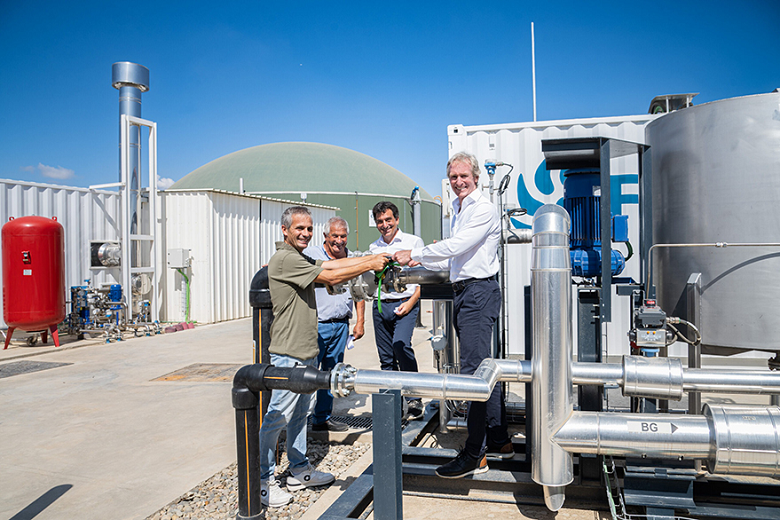CycleØ opens innovative biomethane plant in Lérida

This is the first of twenty plants that are to be set up by the end of 2024, representing an investment of 50 million euros
British biomethane producer CycleØ has opened the first plant in the whole of Spain, being equipped to produce this type of fuel by means of ammonium stripping. It is located in Lérida, situated in the municipality of Vallfogona de Balaguer, and it will process livestock manure from the La Carbona farm to produce a sustainable gas, while at the same time reducing greenhouse gas emissions.
Ammonium stripping technology also makes it possible to obtain a sustainable ammonium sulphate nitrate fertiliser from the liquid portion of the digestate as a by-product. This circular economy approach reduces the need to use mineral fertilisers on the farm, reduces nitrate pollution, minimises transport costs for slurry management and increases income.
Spanish technology
The design, construction and technology for membrane cleaning and biogas compression have been developed by the Spanish company FNX, an industrial subsidiary of CycleØ. The development and construction of the facility, a pioneering project in Spain, involved an investment of 2.5 million euros. With a production capacity of up to 15,000 MWh per year, the plant will prevent around 9,000 tonnes of carbon dioxide from being released into the atmosphere each year.
The British company plans to invest 50 million euros in a total of twenty similar plants located in Spain, aiming for all of them to be in operation or under development by the end of 2024. With this portfolio, the company expects to produce a total of 240 GWh of electricity each year.
Imminent launch
The Lérida plant is CycleØ's second operational facility in Spain, following the one in Vilanant (Gerona). It is the company's first wholly owned facility, and the first to use this innovative technology in Spain. A third facility is scheduled to be commissioned in the coming months, close to the recently opened one, and which will produce around ten GWh per year, following an investment of two million euros.
The technology, created by FNX, which is located in Artea (Vizcaya), is designed for application in small and medium-scale plants in rural areas. CycleØ has focused on these types of installations to reach farms that, according to its calculations, have the potential to generate more than 163 TWh of energy from renewable natural gas.
Circular economy
The Managing Director of FNX, Jordi Berengué Piqué, is extremely enthusiastic, "This is an excellent example of how our modular biogas upgrading technology can bring numerous benefits to the agri-food sector, reducing greenhouse gas emissions and developing circular economy models”.
Cycle CEO Laurence Molke explained in turn that the biomethane obtained from these farms “can be injected into the gas grid or converted into liquefied natural biogas to be used as a fuel for heavy transport”, adding that, “Through projects like this one at La Carbona farm, we’re investing in Spain’s emerging bioenergy sector and helping meet national decarbonisation targets while working with farmers to reduce costs and increase sustainability”.
Photo: CycleØ




